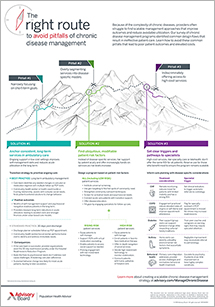Auto logout in seconds.
Continue LogoutMiddle-aged adults who maintain five healthy lifestyle habits may live longer without cardiovascular disease, cancer, and Type 2 diabetes than those who don't, according to a study recently published in BMJ.
The right route to avoid pitfalls of chronic disease management
Study details
The new research from Harvard T.H. Chan School of Public Health is a follow-up to a 2018 study that found adults who maintain five healthy lifestyle habits may live more than 10 years longer than those who don't.
For the latest study, researchers analyzed about 34 years of data on 111,562 adults, including 73,196 women and 38,366 men, to examine the association between major chronic diseases and healthy lifestyle habits.
The researchers focused on three major chronic diseases—cardiovascular disease, cancer, and Type 2 diabetes—and on five healthy lifestyle habits:
- Consuming no more than one serving of alcohol per day for women and no more than two servings of alcohol per day for men;
- Eating a healthy diet, which was defined as a high score on the Alternate Healthy Eating Index;
- Engaging in at least 30 minutes of moderate exercise per day;
- Maintaining a body mass index between 18.5 and 24.9; and
- Never smoking.
The researchers determined how long people who engaged in the five healthy habits and those who did not could live without cardiovascular disease, cancer, and diabetes.
Findings
Overall, the researchers found women who maintained at least four of the five healthy habits at age 50 lived about a decade longer without the chronic diseases when compared with women who did not maintain any of the habits. Specifically, the researchers found women who maintained at least four of the healthy habits at age 50 lived an average of 34.4 additional years free of the conditions, compared with 23.7 additional years among those who did not.
The researchers found men who maintained at least four of the five healthy habits at 50 lived 7.6 years longer without the chronic diseases, when compared with men who did not maintain the habits. In particular, the researchers found men who maintained at least four of the healthy habits lived an average of 31.1 additional years without any of the chronic conditions, compared with an average of 23.5 additional years more among those who did not.
According to the researchers, men who were current heavy smokers and women and men with obesity had the shortest chronic disease-free life expectancy.
Comments
Yanping Li, the study's first author and a senior research scientist in the Harvard T.H. Chan School of Public Health's department of nutrition, said, "Previous studies have found that following a healthy lifestyle improves overall life expectancy and reduces risk of chronic diseases such as diabetes, cardiovascular disease, and cancer, but few studies have looked at the effects of lifestyle factors on life expectancy free from such diseases. This study provides strong evidence that following a healthy lifestyle can substantially extend the years a person lives disease-free."
Frank Hu, a senior author on the study and the chair of the school's nutrition department, said, "Given the high cost of chronic disease treatment, public policies to promote a healthy lifestyle by improving food and physical environments would help to reduce health care costs and improve quality of life" (Roeder, Harvard Gazette, 1/9; WWJ-TV, 1/14; Li, BMJ, 1/8).
Don't miss out on the latest Advisory Board insights
Create your free account to access 1 resource, including the latest research and webinars.
Want access without creating an account?
You have 1 free members-only resource remaining this month.
1 free members-only resources remaining
1 free members-only resources remaining
You've reached your limit of free insights
Become a member to access all of Advisory Board's resources, events, and experts
Never miss out on the latest innovative health care content tailored to you.
Benefits include:
You've reached your limit of free insights
Become a member to access all of Advisory Board's resources, events, and experts
Never miss out on the latest innovative health care content tailored to you.
Benefits include:
This content is available through your Curated Research partnership with Advisory Board. Click on ‘view this resource’ to read the full piece
Email ask@advisory.com to learn more
Click on ‘Become a Member’ to learn about the benefits of a Full-Access partnership with Advisory Board
Never miss out on the latest innovative health care content tailored to you.
Benefits Include:
This is for members only. Learn more.
Click on ‘Become a Member’ to learn about the benefits of a Full-Access partnership with Advisory Board
Never miss out on the latest innovative health care content tailored to you.

